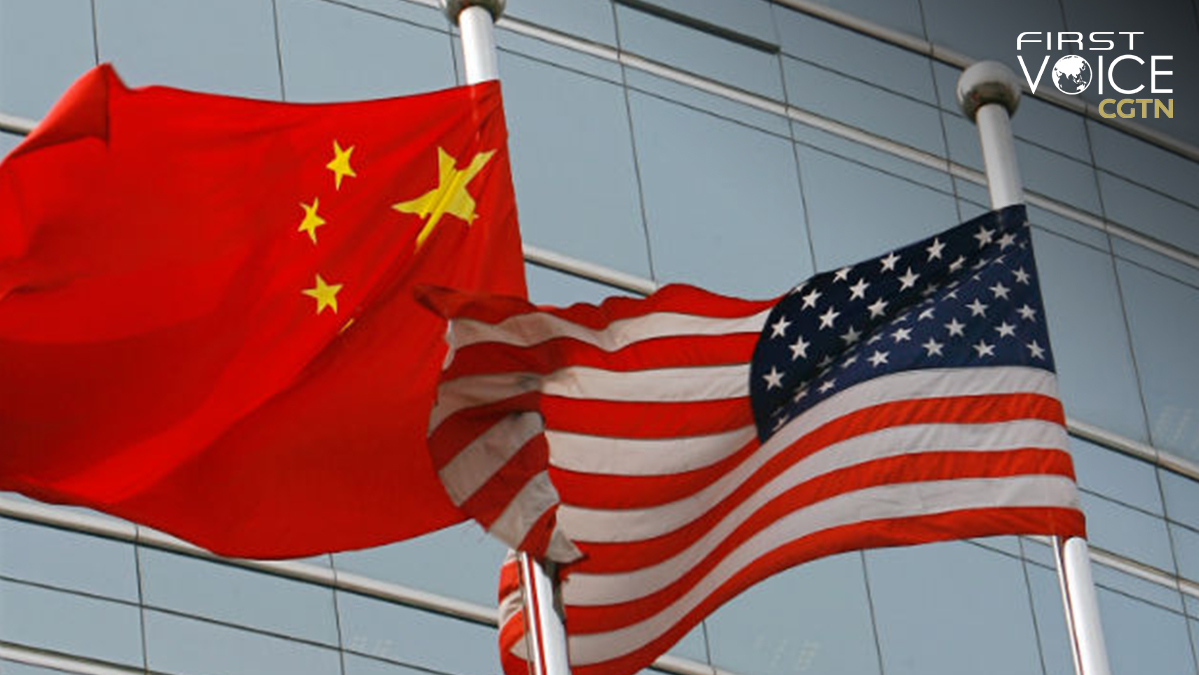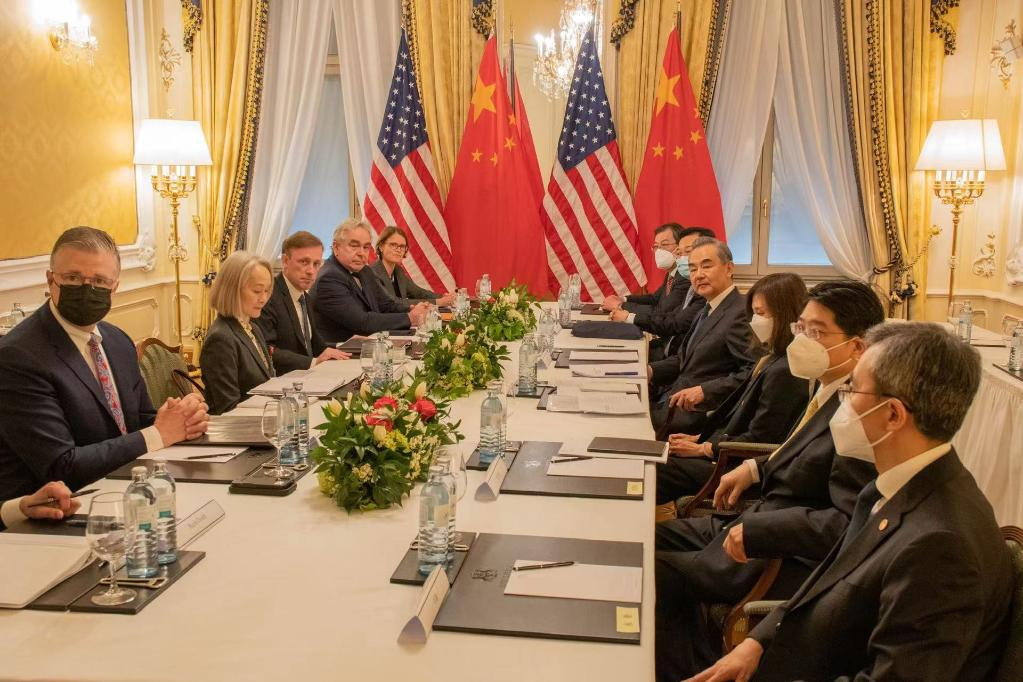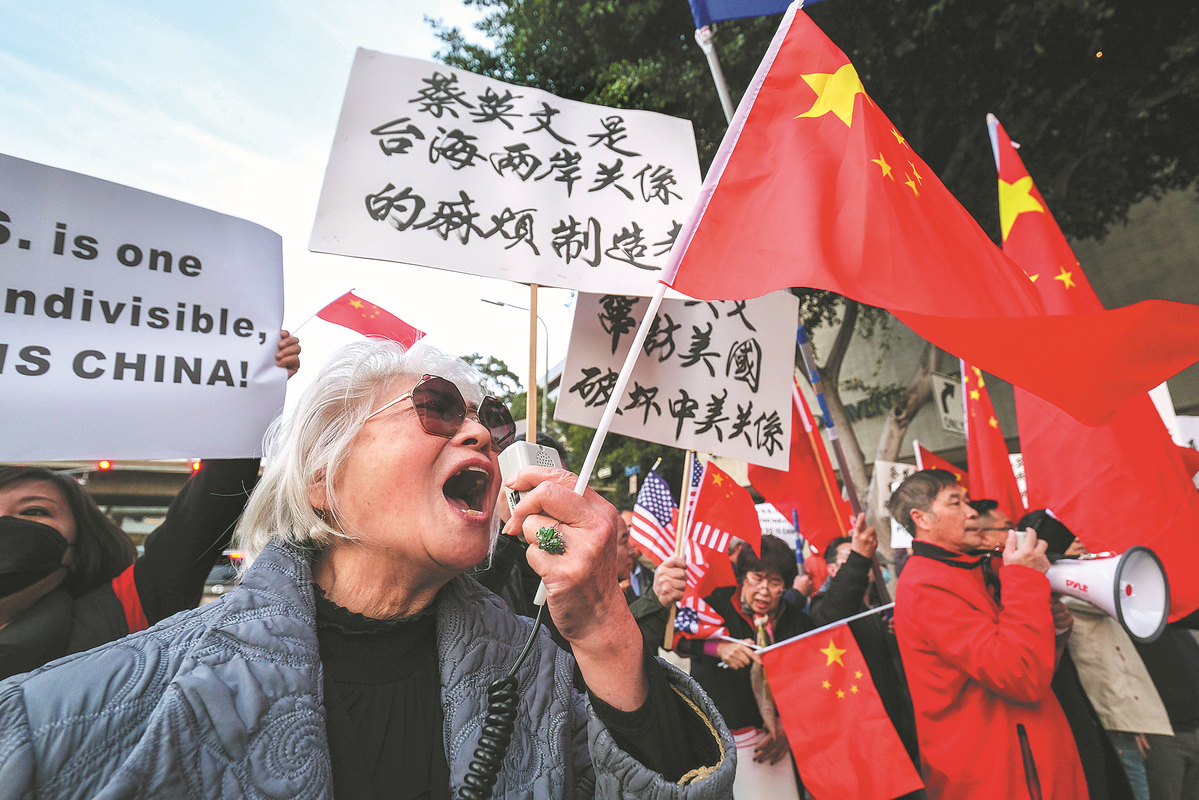
Editor's note: CGTN's First Voice provides instant commentary on breaking stories. The column clarifies emerging issues and better defines the news agenda, offering a Chinese perspective on the latest global events.
Despite the goodwill exchanged at the meeting between Chinese President Xi Jinping and his U.S. counterpart Joe Biden in Bali, Indonesia last November, Beijing and Washington have seen constant conflicts in the past half year.
In February, the U.S. move to shoot down China's civilian unmanned airship put their relationship under a shadow. In March, Washington's arms sale to China's Taiwan region escalated tensions. In April, Taiwan leader Tsai Ing-wen's "transit" trip to the U.S. risked the Taiwan Straits of new conflicts. In May, the meeting between Wang Yi, director of the Office of the Foreign Affairs Commission of the Communist Party of China Central Committee and U.S. National Security Advisor Jake Sullivan prevented China-U.S. ties from deteriorating.
However, a thaw in the China-U.S. relationship is not yet in sight. Washington's credibility gap between what it said and what it did is to blame.
Shouting conversation, but intensifying competition
Washington's Beijing policy is self-contradictory. On the one hand, the U.S. stressed the need to manage differences, and it calls for cooperation with China in climate change, strategic stability, and food security. On the other, it regards China as the "most consequential geopolitical challenge" and America's "pacing challenge," and has laid out a strategy to outcompete the country.
Although the U.S. has made gestures to talk with China, it insists on the goal of containing China and views the Beijing-Washington relationship from the perspective of competition. On April 20, U.S. Treasury Secretary Janet Yellen emphasized the U.S. will safeguard its national security, even if it comes at an economic cost to its relationship with China. On April 27, U.S. National Security Advisor Jake Sullivan pledged to renew American economic leadership and stressed the need for de-risking in competition with China.

Wang Yi, a member of the Political Bureau of the Communist Party of China (CPC) Central Committee and director of the Office of the Foreign Affairs Commission of the CPC Central Committee, meets with U.S. National Security Advisor Jake Sullivan in Vienna, Austria, May 10, 2023. /Xinhua
Wang Yi, a member of the Political Bureau of the Communist Party of China (CPC) Central Committee and director of the Office of the Foreign Affairs Commission of the CPC Central Committee, meets with U.S. National Security Advisor Jake Sullivan in Vienna, Austria, May 10, 2023. /Xinhua
While the U.S. calls for cooperation and talks with China, it regards the country as an adversary. This is unacceptable. The U.S. calls for cooperation with China on areas of intersecting interests, but the dominant theme uniting the calls for diplomacy is the need to isolate adversaries,said Evan Cooper, previously a junior fellow in the Atlantic Council's New American Engagement Initiative. Washington's double standards cannot win positive feedback from the Chinese side.
Shouting not seeking new Cold War, but intensifying anti-China alliance
American officials clarified that the U.S. does not seek a "new Cold War" and will not consolidate its alliance to attack China. But in reality, Washington has been stoking divisions with China in ideology, international mechanism, and geopolitics, actively building an anti-Beijing alliance, and pushing China-U.S. ties into a downward spiral.
For instance, the U.S. is building the discourse that China is to blame for the Ukraine crisis. Accusing China of "colluding" with Russia, Washington intends to accelerate anti-China moves. Since the outbreak of the Russia-Ukraine conflicts, the U.S. has been hyping the"China threat" theory and spreading lies about Beijing offering "secret support" to Moscow. By doing so, Washington attempts to woo Australia, India and other allies into a united anti-China front, strengthen alliance in the Indo-Pacific region under the schemes of AUKUS, QUAD, and the Five Eye, and tie European countries into its anti-China chariot. In this way, the U.S. is dividing the international community into "two worlds."
Shouting supporting 'one-China policy,' but playing Taiwan card to contain China
The Taiwan question is at the very core of China's core interests and the bedrock of the political foundation of China-U.S. relations. Although the U.S. claims that it is committed to the "one-China policy," does not support Taiwan’s independence, and has no intention to clash with China, it insists on prioritizing Taiwan Relations Act and Six Assurances over the "one-China policy." The White House has repeatedly sold arms to the Taiwan region, deliberately destroying peace and stability across the Taiwan Straits, and sending wrong signals to pro-independence forces.

Protesters from Chinese American groups gather in front of a hotel in Los Angeles, California, the United States, where the leader of the Taiwan region Tsai Ing-wen is scheduled to stay, April 7, 2023. /Xinhua
Protesters from Chinese American groups gather in front of a hotel in Los Angeles, California, the United States, where the leader of the Taiwan region Tsai Ing-wen is scheduled to stay, April 7, 2023. /Xinhua
The Biden administration has intensified interventions into the Taiwan question in the past half year. In March, it approved an estimated $619 million potential arms sale to the Taiwan region – the ninth approved arms package under Biden. In April, in disregard of China's strong opposition and solemn representation, U.S. House Speaker Kevin McCarthy and other congressional members insisted on meeting with Tsai. In the same month, U.S. Navy's 7th Fleet announced its guided-missile destroyer conducted a "routine Taiwan Straits transit" and the U.S. government sent around 200 soldiers to the Taiwan region to provide training.
The Taiwan question is the first red line that must not be crossed in China-U.S. relations. However, Washington, while shouting about the "one-China policy," has repeatedly challenged China's core interests. Playing the Taiwan card to contain China, Washington has severely interfered in China's domestic affairs and eroded the political foundations of China-U.S. ties.
Shouting no to decoupling, but accelerating de-sinicizing moves
The U.S. claimed that it does not seek decoupling with China and has no intention to thwart China's economic growth. However, the White House, by means of export bans, investment reviews, and exclusive supply-chain alliances, has been containing China's growth. Under the guise of "safeguarding national security," the U.S. has been actively pushing the decoupling with China in advanced technology and key supply chains.

The U.S. restricts exports of two of Nvidia's top computing chips for AI, the H100 and A100, to China, according to a filing, August 31, 2022. /CFP
The U.S. restricts exports of two of Nvidia's top computing chips for AI, the H100 and A100, to China, according to a filing, August 31, 2022. /CFP
In January, the U.S. wooed Japan, and the Netherlands to restrict the export of advanced semiconductor equipment to China, limiting China's access to advanced semiconductor manufacturing equipment. In February, the U.S.-led Chip 4 alliance held a video conference, with China as the target. In May, Indo-Pacific Economic Framework for Prosperity ministerial meeting reached a consensus on reducing Asian Pacific countries' reliance on China's supply chains. In June, legislation to strip China of its status as a "developing nation" at some international organizations was passed by a U.S. Senate committee.
The U.S. has been self-contrary in its China policy. Recently, the U.S. has spread news about Secretary of State Antony Blinken's visit to China. Beijing should watch Washington's acts, not just words. Whether the Biden administration's "goodwill" is sincere or to win over political opponents and woo support from consortiums needs to be carefully distinguished. China and the international community won't be fooled by Washington's rhetoric.
(If you want to contribute and have specific expertise, please contact us at opinions@cgtn.com. Follow @thouse_opinions on Twitter to discover the latest commentaries in the CGTN Opinion Section.)